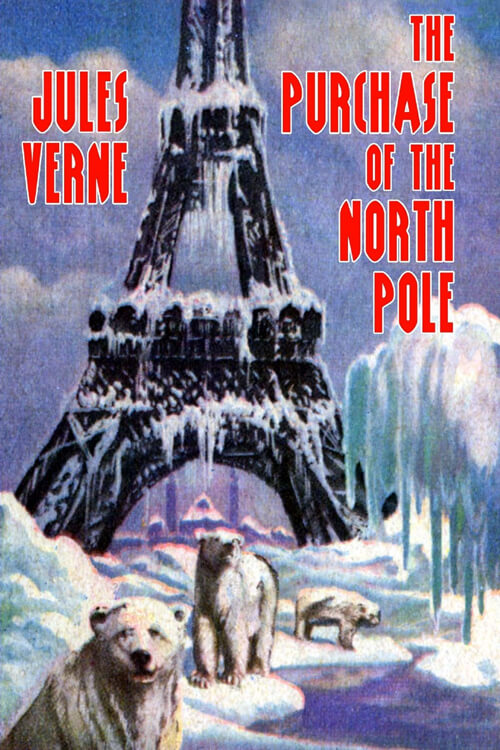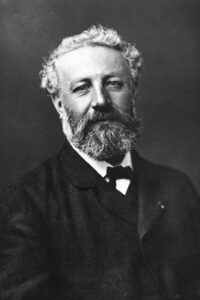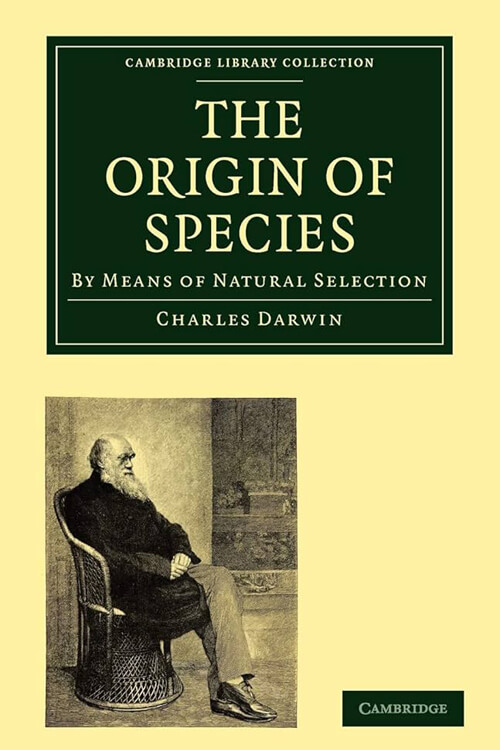
The Purchase of the North Pole
“And so, Mr. Maston, you consider that a woman can do nothing to advance the mathematical or experimental sciences?”
“To my extreme regret, Mrs. Scorbitt,” said J. T. Maston, “I am obliged to say so. That there have been many remarkable female mathematicians, especially in Russia, I willingly admit; but with her cerebral conformation it is not in a woman to become an Archimedes or a Newton.”
“Then, Mr. Maston, allow me to protest in the name of my sex—”
“Sex all the more charming, Mrs. Scorbitt, from its never having taken to transcendental studies!”
“According to you, Mr. Maston, if a woman had seen an apple fall she would never have been able to discover the laws of universal gravitation as did the illustrious Englishman at the close of the seventeenth century!”
“In seeing an apple fall, Mrs. Scorbitt, a woman would have only one idea—to eat it, after the example of our mother Eve.”
“You deny us all aptitude for the higher speculations—”
“All aptitude? No, Mrs. Scorbitt. But I would ask you to remember that since there have been people on this earth, and women consequently, there has never been discovered a feminine brain to which we owe a discovery in the domain of science analogous to the discoveries of Aristotle, Euclid, Kepler, or Laplace.”
“Is that a reason? Is it inevitable that the future should be as the past?”
“Hum! That which has not happened for thousands of years is not likely to happen.”
“Then we must resign ourselves to our fate, Mr. Maston. And as we are indeed good—”
“And how good!” interrupted J. T. Maston, with all the amiable gallantry of which a philosopher crammed with x was capable.
Mrs. Scorbitt was quite ready to be convinced.
“Well, Mr. Maston,” she said, “each to his lot in this world. Remain the extraordinary mathematician that you are. Give yourself entirely to the problems of that immense enterprise to which you and your friends have devoted their lives! I will remain the good woman I ought to be, and assist you with the means.”
“For which you will have our eternal gratitude,” said J. T. Maston.
Mrs. Scorbitt blushed deliciously, for she felt, if not for philosophers in general, at least for J. T. Maston, a truly strange sympathy. Is not a woman’s heart unfathomable?
An immense enterprise it was which this wealthy American widow had resolved to support with large sums of money. The object of its promoters was as follows:—
The Arctic territories, properly so called, according to the highest geographical authorities, are bounded by the seventy-eighth parallel, and extend over fourteen hundred thousand square miles, while the seas extend over seven hundred thousand.
Read or download Book
Jules Verne
Jules Gabriel Verne (8 February 1828 – 24 March 1905) was a French novelist, poet, and playwright. His collaboration with the publisher Pierre-Jules Hetzel led to the creation of the Voyages Extraordinaires, a series of bestselling adventure novels including Journey to the Center of the Earth (1864), Twenty Thousand Leagues Under the Seas (1870), and Around the World in Eighty Days (1872). His novels, always well documented, are generally set in the second half of the 19th century, taking into account the technological advances of the time.
In addition to his novels, he wrote numerous plays, short stories, autobiographical accounts, poetry, songs, and scientific, artistic, and literary studies. His work has been adapted for film and television since the beginning of cinema, as well as for comic books, theater, opera, music, and video games.
Verne is considered to be an important author in France and most of Europe, where he has had a wide influence on the literary avant-garde and surrealism. His reputation was markedly different in the Anglosphere where he had often been labeled a writer of genre fiction or children’s books, largely because of the highly abridged and altered translations in which his novels have often been printed. Since the 1980s, his literary reputation has improved.
Jules Verne has been the second most-translated author in the world since 1979, ranking below Agatha Christie and above William Shakespeare. He has sometimes been called the “father of science fiction”, a title that has also been given to H. G. Wells and Hugo Gernsback. In the 2010s, he was the most translated French author in the world. In France, 2005 was declared “Jules Verne Year” on the occasion of the centenary of the writer’s death.
Life
Early life
Verne was born on 8 February 1828, on Île Feydeau, a then small artificial island on the river Loire within the town of Nantes (later filled-in and incorporated into the surrounding land area), in No. 4 Rue Olivier-de-Clisson, the house of his maternal grandmother Dame Sophie Marie Adélaïde Julienne Allotte de La Fuÿe (born Guillochet de La Perrière). His parents were Pierre Verne, an attorney originally from Provins, and Sophie Allotte de La Fuÿe, a Nantes woman from a local family of navigators and shipowners, of distant Scottish descent. In 1829, the Verne family moved some hundred meters away to No. 2 Quai Jean-Bart, where Verne’s brother Paul was born the same year. Three sisters, Anne “Anna” (1836), Mathilde (1839), and Marie (1842) would follow.
In 1834, at the age of six, Verne was sent to boarding school at 5 Place du Bouffay in Nantes. The teacher, Madame Sambin, was the widow of a naval captain who had disappeared some 30 years before. Madame Sambin often told the students that her husband was a shipwrecked castaway and that he would eventually return like Robinson Crusoe from his desert island paradise. The theme of the robinsonade would stay with Verne throughout his life and appear in many of his novels, some of which include The Mysterious Island (1874), Second Fatherland (1900), and The School for Robinsons (1882).
In 1836, Verne went on to École Saint‑Stanislas, a Catholic school suiting the pious religious tastes of his father. Verne quickly distinguished himself in mémoire (recitation from memory), geography, Greek, Latin, and singing. In the same year, 1836, Pierre Verne bought a vacation house at 29 Rue des Réformés in the village of Chantenay (now part of Nantes) on the Loire. In his brief memoir Souvenirs d’enfance et de jeunesse (Memories of Childhood and Youth, 1890), Verne recalled a deep fascination with the river and with the many merchant vessels navigating it. He also took vacations at Brains, in the house of his uncle Prudent Allotte, a retired shipowner, who had gone around the world and served as mayor of Brains from 1828 to 1837. Verne took joy in playing interminable rounds of the Game of the Goose with his uncle, and both the game and his uncle’s name would be memorialized in two late novels (The Will of an Eccentric (1900) and Robur the Conqueror (1886), respectively).
Literary debut
Thanks to his visits to salons, Verne came into contact in 1849 with Alexandre Dumas through the mutual acquaintance of a celebrated chirologist of the time, the Chevalier d’Arpentigny. Verne became close friends with Dumas’ son, Alexandre Dumas Fils, and showed him a manuscript for a stage comedy, Les Pailles rompues (The Broken Straws). The two young men revised the play together, and Dumas, through arrangements with his father, had it produced by the Opéra-National at the Théâtre Historique in Paris, opening on 12 June 1850.
In 1851, Verne met with a fellow writer from Nantes, Pierre-Michel-François Chevalier (known as “Pitre-Chevalier”), the editor-in-chief of the magazine Musée des familles (The Family Museum). Pitre-Chevalier was looking for articles about geography, history, science, and technology, and was keen to make sure that the educational component would be made accessible to large popular audiences using a straightforward prose style or an engaging fictional story. Verne, with his delight in diligent research, especially in geography, was a natural for the job. Verne first offered him a short historical adventure story, The First Ships of the Mexican Navy, written in the style of James Fenimore Cooper, whose novels had deeply influenced him. Pitre-Chevalier published it in July 1851, and in the same year published a second short story by Verne, A Voyage in a Balloon (August 1851). The latter story, with its combination of adventurous narrative, travel themes, and detailed historical research, would later be described by Verne as “the first indication of the line of novel that I was destined to follow”.
Dumas fils put Verne in contact with Jules Seveste, a stage director who had taken over the directorship of the Théâtre Historique and renamed it the Théâtre Lyrique. Seveste offered Verne the job of secretary of the theater, with little or no salary attached. Verne accepted, using the opportunity to write and produce several comic operas written in collaboration with Hignard and the prolific librettist Michel Carré. To celebrate his employment at the Théâtre Lyrique, Verne joined with ten friends to found a bachelors’ dining club, the Onze-sans-femme (Eleven Bachelors).






